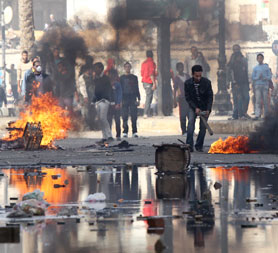Thousands protest as Egypt unrest rages
Security forces clash with protesters as thousands of anti-government demonstrators take to the streets across Egypt amid a crackdown of internet communication. Channel 4 News reports from Cairo.
Tens of thousands of demonstrators calling for an end to President Hosni Mubarak’s 30-year rule clashed with police on Friday amid continuing unrest across the country.
Emboldened by this month’s revolt that toppled the authoritarian leader of Tunisia, Egyptians have staged mass protests since Tuesday.
Demonstrations erupted after Friday prayers. Activists earlier told Channel 4 News they expected the protests to be “huge”.
“People in the streets are speaking about the demonstrations – normal, regular people and not only civil society activists,” a blogger and human rights activist told Channel 4 News.
“Many, many people have joined the demos in different cities in Egypt.”
Violence in Cairo
The Channel 4 News correspondent witnessed a violent standoff in the Egyptian capital Cairo where thousands clashed with police.
The crowd dispersed as riot police fired tear gas at protesters chanting “change, change”, “God is great” and the national anthem.
A large group of what are believed to have been plainclothes police officers ran towards demonstrators gathered on a bridge in the city.
Activists later regrouped chanting “people want democracy”. There were reports of rubber bullets being fired at protesters. A water cannon was fired at thousands gather on the Kasrenile Bridge in the capital.
Police fired salvos of tear gas to clear the area while protesters retaliated by throwing rocks and Molotov cocktails.
Amid smoke from a burning police kiosk around 500 protesters knelt to pray towards Mecca.
Clashes have been reported across the country in Giza and Menia.

Earlier a demonstration organiser told Channel 4 News that details of protests had been sent out on Thursday to pre-empt a communications crackdown.
He showed the Channel 4 News correspondent bruises and a black eye allegedly from a police beating earlier this week.
“We never dreamt all these people would take to the streets”, he said, adding that more action is expected on Saturday.
ElBaradei returns
Nobel Peace Prize winner and reform advocate Mohamed ElBaradei returned to Egypt from Vienna on Thursday and vowed to join Friday’s protest.
He called for Mubarak to resign, adding that the “barrier of fear” had been broken.
According to reports police prevented him from leaving an area in Cairo on Friday where protests erupted. He had earlier joined prayers of about 2,000 people.
Communication crackdown
Internet access was shut down across the country shortly after midnight. Mobile phone text messaging services are also disabled, working only sporadically.
Vodafone group said all mobile operators in Egypt had been instructed to suspend services in selected areas.
“All mobile operators in Egypt have been instructed to suspend services in selected areas,” Vodafone group said in a statement.
“Under Egyptian legislation the authorities have the right to issue such an order and we are obliged to comply with it. The Egyptian authorities will be clarifying the situation in due course.”
Protesters have relied on the internet, especially social media services like Twitter and Facebook, to organise demonstrations and to share video and pictures of events.
US-based internet monitoring firm Renesys said the total shutdown of the web it recorded early on Friday was “unprecedented in internet history”, going far beyond measures taken during Tunisia’s protests or the 2009 unrest in Iran.
US State Department spokesman P.J. Crowley tweeted: “We are concerned that communications services, including the internet, social media, and even this tweet are being blocked in Egypt.”
A page on Facebook social networking site listed more than 30 mosques and churches where protesters were expected gather.
“Egypt’s Muslims and Christians will go out to fight against corruption, unemployment and oppression and absence of freedom.”
Obama pressures regime
After three days of unrest US President Barack Obama has spoken out about the protests for the first time.
He called on Egyptian President Mubarak to make “absolutely critical” reforms, ratcheting up pressure on the key US ally.
Obama was careful to avoid any sign of abandoning Mubarak but made clear his sympathy for demonstrators he said were expressing “pent-up frustrations” over the lack of meaningful change.
A number of people have died in clashes since Tuesday as waves of protesters have fought with police.
The city of Suez has seen some of the worst violence with police firing tear gas at protesters who hurled rocks and petrol bombs into the early hours of Friday morning. Fires burned in the street, filling the air with smoke.
Demonstrators dragged away their wounded comrades into alleys. Security forces shot dead a protester in the north of the Sinai region on Thursday, bringing the death toll to five.
“This is a revolution,” one 16-year-old protester said in Suez late on Thursday. “Every day we’re coming back here.”